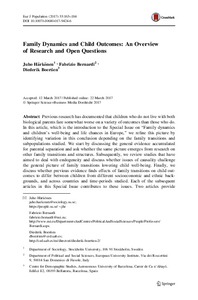Family dynamics and child outcomes: Key findings and unresolved questions
Härkönen Juho; Boertien Diederik; Bernardi Fabrizio
https://urn.fi/URN:NBN:fi-fe2021042717908
Tiivistelmä
Previous research has documented that children who do not live with both biological parents fare somewhat worse on a variety of outcomes than those who do. In this article, which is the introduction to the Special Issue on “Family dynamics and children’s well-being and life chances in Europe,” we refine this picture by identifying variation in this conclusion depending on the family transitions and subpopulations studied. We start by discussing the general evidence accumulated for parental separation and ask whether the same picture emerges from research on other family transitions and structures. Subsequently, we review studies that have aimed to deal with endogeneity and discuss whether issues of causality challenge the general picture of family transitions lowering child well-being. Finally, we discuss whether previous evidence finds effects of family transitions on child outcomes to differ between children from different socioeconomic and ethnic backgrounds, and across countries and time-periods studied. Each of the subsequent articles in this Special Issue contributes to these issues. Two articles provide evidence on how several less often studied family forms relate to child outcomes in the European context. Two other articles in this Special Issue contribute by resolving several key questions in research on variation in the consequences of parental separation by socioeconomic and immigrant background, two areas of research that have produced conflicting results so far.
Kokoelmat
- Rinnakkaistallenteet [19207]
